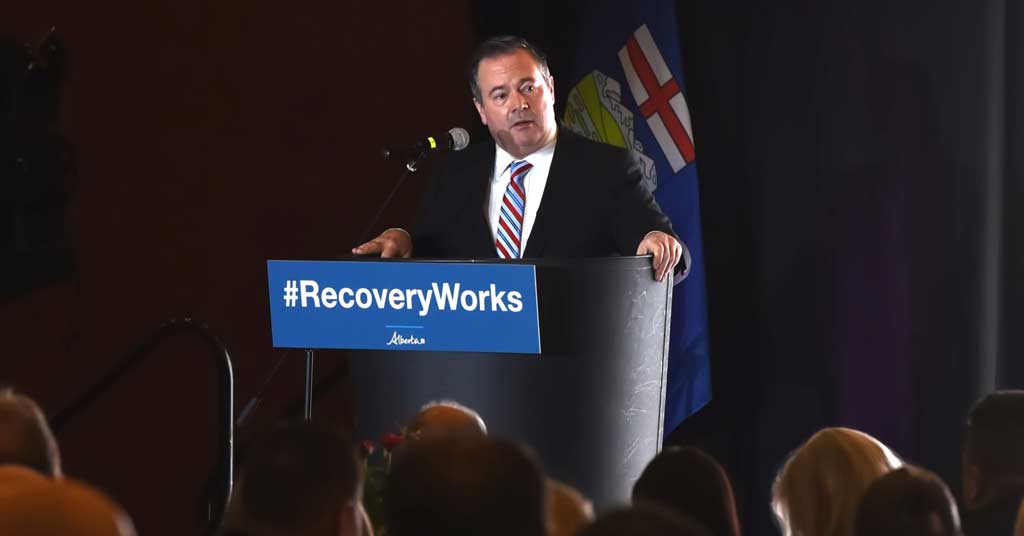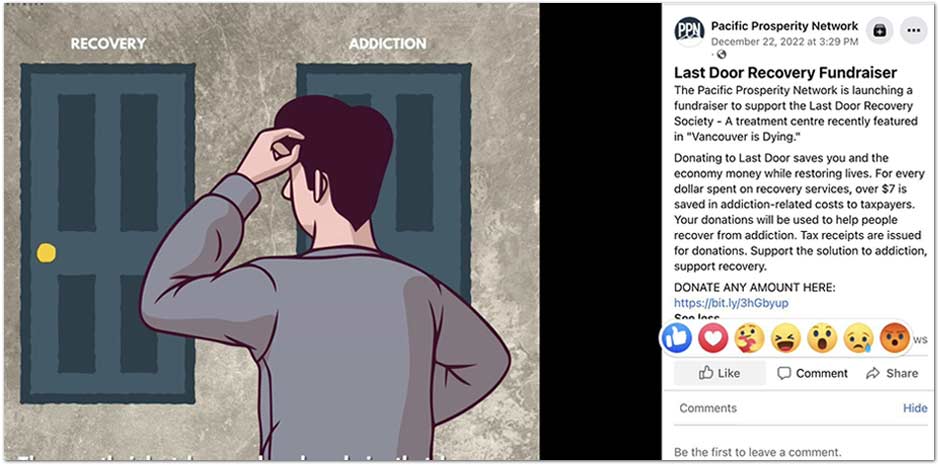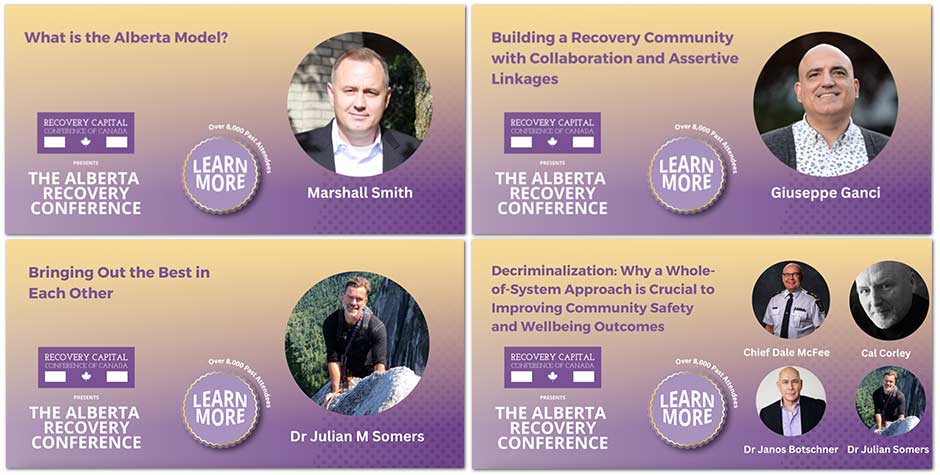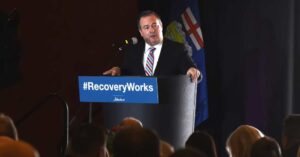
‘Recovery Industry’ Groups Attacking ‘Safe Supply’ in BC Have Deep Ties With Conservative Political Actors
Web of connections link dubious “recovery” advocates with right-wing political actors in BC and Alberta
A network of “recovery industry” groups inciting panics over drug use and promoting private recovery facilities over “safe supply” initiatives have numerous ties with conservative political actors.
Many of the attacks on “safe supply” come from the same handful of voices and often use parallel messaging about “cleaning up the streets” and promoting recovery as a solution to the crisis, irrespective of the issues being raised by support workers and drug users themselves.
Many of these voices also have a shared interest in promoting private recovery facilities – in British Columbia, these facilities, many of which are private, are unregulated and charge tens of thousands of dollars.
Unregulated private recovery facilities often push dubious treatment programs, experts say
Euan Thomson, Executive Director at Each and Every, says the unregulated recovery industry, which is being used as the central element of the national response to the drug crisis, is offering up individualized solutions to systemic issues.
“Addiction treatment represents a tip of the spear on privatized medicine, (although) it’s not really medicine, because there’s not a lot of actual medical evidence behind most addiction treatment formats, other than opioid agonist therapy, which is definitely evidence-based,” Thomson told PressProgress.
“A lot of these 12-Step programs and stuff, there’s really no evidence at all for them. And so, having this big, sweeping, publicly-funded network of facilities that are actually privately-run, privately-owned in many cases and for-profit, in other cases, opens up this opportunity to say that the private medicine system is working.”
With forced treatment or with the integration of police into social services or in the response to drug use, Thomson says it essentially guarantees private facilities will have clients.
“It’s kind of like cleaning up the streets by another name, and using addiction treatment as incarceration,” Thomson said.
Thomson adds that despite having no regulations, “experts” from the recovery industry are repeatedly given authority in conversations regarding drug use, and legitimized by politicians who benefit from their existence.
Last Door Addiction Treatment Centre has numerous ties with right-wing political actors
An employee of Last Door Addiction Treatment Centre in BC, a group with ties to right-wing political activists and politicians, was recently in the news for creating a panic around diverted safe supply to teens in Vancouver.
Another employee from the Last Door was recently listed endorsing BC Liberal Leader Kevin Falcon’s plan for mental health and addictions in the province, to “build a recovery-oriented system of care.”
Leader of the @bcliberals @KevinFalcon and MLA @elenoresturko asking questions about #ROSC #RecoveryCapital #Recovery and our lived and professional lived experience while feeling the #NewWestRecovery energy. Thanks for asking and listening. #OvercomeAddiction #StopOverdose pic.twitter.com/s5Bfdx3nNm
— Last Door Rehab (@Last_Door) January 27, 2023
This week, allegations of sexual misconduct against a contractor at Last Door, who had been working there for over a decade, came to light in an anonymous Facebook page. Last Door says they have cut ties with the individual as police launch an investigation.
Giuseppe Ganci, Director of Community Development at Last Door was also featured in a panel related to the controversial documentary “Vancouver is Dying,” that demonized Vancouver’s homeless and residents on the Downtown Eastside.
Also featured at the “Vancouver is Dying” documentary panel was SFU Professor Dr. Julian Somers, who was recently the subject of a National Post article, fear mongering about safe supply.

Aaron Gunn (Facebook)
Somers’ article was promoted by Pierre Poilievre, who also recently called Vancouver’s Downtown Eastside “hell on earth.”
Coincidentally, Somers was also listed as another voice endorsing the BC Liberals recovery-based addictions plan.
“Kevin Falcon ideologically is very in favor of forced abstinence, the elimination of safe supply, etcetera, and I think there’s kind of a symbiotic relationship happening with the Last Door and these political figures,” Nicole Luongo, Systems Change Coordinator at the Canadian Drug Policy Coalition BC told PressProgress.
The premiere and panel for Vancouver is Dying was sponsored by the Pacific Prosperity Network, a right-wing astro-turf group funded by Lululemon founder Chip Wilson.
Coincidentally, the Pacific Prosperity Network posted to their Facebook page raising funds for The Last Door.

Pacific Prosperity Network (Facebook)
Key figures attended “Recovery Capital Conference” sponsored by Alberta Government
The Last Door and some of the right-wing voices opposing safe supply and harm reduction in favour of abstinence based treatment also have ties to Alberta, where the same model is being pushed.
Marshall Smith, Chief of Staff for Alberta Premiere Danielle Smith, was also featured in the “Vancouver is Dying” documentary.
Smith, who has been credited as the man behind Alberta’s pull away from harm reduction, has previously been in hot water over a scandal at a BC rehab facility, where people seeking treatment were allegedly used to provide free labour for the BC Liberals.
Smith is also a prominent figure at the Recovery Capital Conference of Canada, which is organized by Last Door, and the Chair of the conference is Giuseppe Ganci, also of Last Door.
Last year’s conference featured current Alberta Premier Danielle Smith and former Premier Jason Kenney, who has attended multiple events linked to Last Door in recent years, as speakers.
The 2023 conference, for which tickets cost $530 a head, features Smith, Ganci and Somers as keynote speakers.
Julian Somers was also commissioned by the UCP to write a report criticizing safe supply. More than 50 experts signed an open letter condemning the report and its methodologies, which they described as “critically low quality.”

Marshall Smith, Giusseppe Ganci, Julian Somers and Dale McPhee spoke at Alberta Recovery Capital Conference
“It’s not real recovery,” it’s a “new way to basically make money”
Michelle Robinson, Sahtu Dene host of the Native Calgarian podcast, was given a ticket to last year’s conference.
“When I attended, I knew that it was mainly non-Indigenous people, and mainly white presenting people, and that this was a new way to basically make money,” Robinson told PressProgress.
“Instead of having a prison system, they are out there I would say almost appropriating terminology like recovery—it’s not real recovery. It’s just institutionalization of folks with addiction.”
Robinson says that many of the solutions being offered up at conferences like these are not trauma informed and do not take into account the lived experiences of Indigenous people in Canada.
“It was disappointing to see what people were being given a platform for, as opposed to someone who has boots on the ground, it was just so incredibly one sided,” said Robinson.
“We didn’t even discuss why the current models are not working and the problems with policing, it was very much a pro-policing type environment as opposed to seeing the other side of it and there was nothing about cultural inclusion.”
Robinson says that the lack of attention to the impact of trauma is perpetuating a cycle instead of listening to the solutions being offered up by the community.
“I think what we’re going to see is in another 10 to 20 years, yet another report on Indigenous issues that will add this addiction treatment that they’re doing, because it’s just another form of prison that they’re forcing Indigenous people to go through,” said Robinson.
“They’re making money off of people’s trauma and addiction.”
The web of connections certainly doesn’t end at the conference – LastDoor also received funding from the Government of Alberta for an app called “My Recovery Plan,” which was designed to address some of the systemic problems raised by a coalition of actors doing harm reduction work in the province.
According to Thomson, Last Door’s 2021 CRA filing indicates that they brought in over $1 million in government funding and over $2.5 million in apparent revenue-generating activity in 2021.
Our journalism is powered by readers like you.
We’re an award-winning non-profit news organization that covers topics like social and economic inequality, big business and labour, and right-wing extremism.
Help us build so we can bring to light stories that don’t get the attention they deserve from Canada’s big corporate media outlets.
Donate



